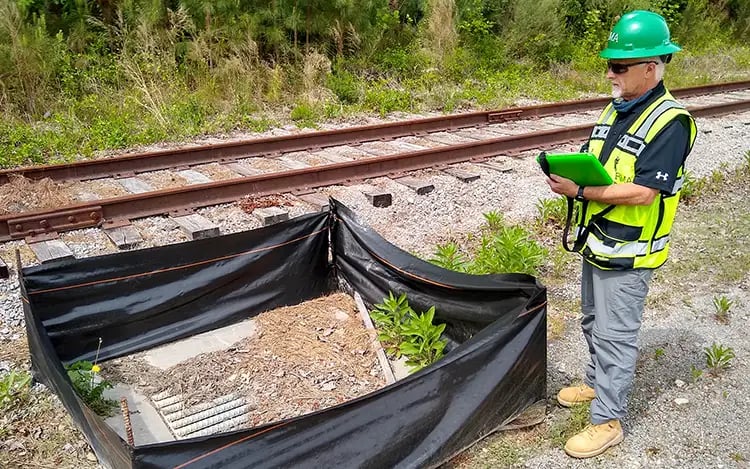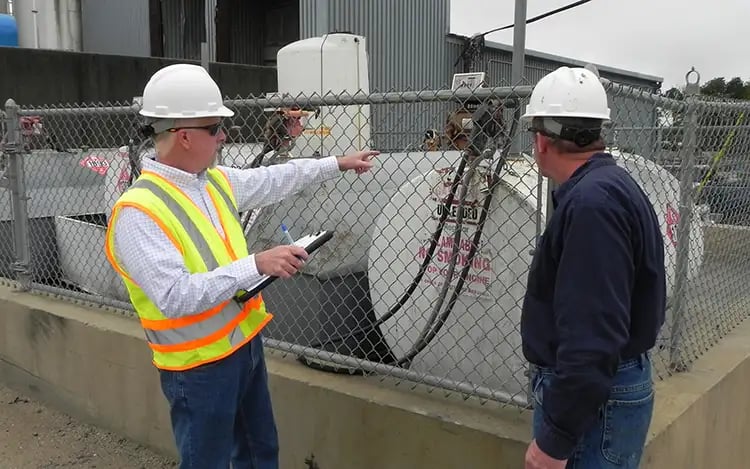We discuss environmental audits, why you may consider using one, and how they could benefit your operation.
If you type into Google "definition of audit", you get a pretty clear answer, which is "an official inspection of an individual's or organization's accounts, typically by an independent body." That's a perfect answer. If you add the word environmental into that definition, you've got a somewhat vague, but good representation of the term.
While that might not clear the air completely, it should at least let you know it's an "inspection", and again, since we're talking about environmental regulations, an environmental audit, at least in this instance, is referring to auditing how your facility is handling it's environmental regulatory compliance overall.
Why would I need an environmental audit?
I'll admit, as much of a pain as they can be sometimes, I'm a huge fan of audits.
On a personal level, most people get audits all the time. You, like most other people, probably don't ignore your health. In fact, most people visit the doctor on a regular basis for a routine head-to-toe checkup. We know we can't ignore ourselves, so we get a comprehensive checkup. That makes sense, right?
Or, you take your car in for an inspection. You tell your mechanic to check everything out and let me know what you think. Your safety in that vehicle is paramount, so you get an "audit" of the vehicle and how it's running. You want to know where you stand, what's working, what's not, and how to improve.

The same goes for environmental regulations. An environmental audit is simply a benchmark of where your operation stands in comparison to applicable rules, laws, and regulations that apply to your industry and/or facility.
Why might you need one?
For the same reason you get yourself (or your car) "inspected" by a professional - to figure out where you stand, what needs improvement, and what is an impending threat.
What is an environmental audit?
If you take both of those examples and put in place your facility, operation, or whatever you run, you're getting close to understanding what an audit is. It's basically a complete head-to-toe checkup, done on a regular basis, preferably by an expert, in order to gauge the health of your state of environmental compliance with regulations.
So, you'd hire an expert, have them come in, review your operation, your permits, approvals, etc., and they would turn around and give you a report on how everything is.
Now, I said before preferably by an expert, because honestly, you don't need an expert per se, nor do you need an outside expert at that!
You can get a facility manager or environmental member of your staff to do one, but do you really expect either of those people to be fair and unbiased? Do you really think the environmental manager is going to openly & transparently report on areas that he's completely dropping the ball on? It's not going to happen.
Every audit I've gotten my hands on in the last 20+ years done by a staff member, or someone who's not an expert on regulations, is always missing something (usually glaringly, too), they're often incomplete, or really just a waste of time and money for the organization.
Imagine if you stood in front of a mirror and diagnosed your health. I know I would rather get a doctor's opinion.
Consider the same with an audit. Get an outsider, someone who's a professional. Don't use a current employee or a staff member from a sister operation. You need someone who's not biased, and not going to be influenced by job pressures. If performed correctly, a comprehensive environmental audit can provide an awful lot of benefits.
Environmental Audits & the USEPA
The USEPA is obviously a huge fan of auditing, so much so that they have their own definition for them. It's a bit dated, but stands the test of time:
“A systematic, documented, periodic, and objective review of facility operations and practices related to meeting environmental requirements.”
The policy also identified several objectives for audits (USEPA, Auditing Statement, 1986):
- Verifying compliance with environmental requirements;
- Evaluating the effectiveness of in-place environmental management systems; and
- Assessing risks from regulated and unregulated materials and practices.
While that seems like a mouthful, there are a few key elements there that absolutely should be a part of every audit.
- Systematic Audits - Following some type of auditing program, using standard practices, done comprehensively, providing for that "head to toe" type review. Basically, you're following rules about how to do the audit and not just winging it.
- Documented Audits - Simple. The audit is recorded somehow via writing or on a computer or via software. You document your findings and keep track of it.
- Periodic Audits - This means the audits are done regularly, not just one time. This is subjective as your audits could be bi-annually, annually, every other year, every 5 years, etc.
- Objective Audits - The audit is performed by someone without a vested interest in the outcome. So if your environmental manager's job, pay, or position depends on the finding of the audit he/she is conducting, it's not objective. This is basically saying to have an outsider do the audit.
- Verifying Compliance - Ensuring you are in compliance with every rule and regulation which applies to your operation or facility, and all facets of those regulations. Not just picking and choosing, electing to ignore the ones you aren't sure about or know you're not in compliance with. It means you're on par with every applicable federal, state, and possibly even county and city regulation that apply to your business.
Where people fail with environmental audits.
From our past experiences, two key points that we routinely see facilities fail with are periodic and objective auditing. We find many facilities get an audit once and that's it. That's great, but it's not helpful anymore. It's like saying you went to a doctor in your 20s, and 15 years later you're still in good health. It doesn't work like that.
Regulations change, and they could make a significant impact on your operation.
Conversely, we find a lot of facilities do use an employee, or a staff member from another facility to conduct the audit. I'm glad that facilities are even looking, but at the same time, this is a bad exercise because these people are not objective.
Environmental Audits Can Be Valuable Tools
If you have an audit conducted correctly, it's an invaluable tool. Most importantly, it helps keep your facility out of trouble from regulators, and free of fines and penalties. Considering that the cost for non-compliance can be extreme, auditing can be a way of identifying a problem ahead of time, and preventing anything bad from ever happening. If you're unaware of how much fines and penalties can cost, check out these articles for some additional information:
An audit helps you determine where you stand, sets you on a path to correct deficiencies, and ensures you're in compliance.
Another issue we frequently see is when facilities conduct an audit and find a deficiency... and they don't address it.
Think about it: you've now documented you're not following environmental laws and regulations, and you're not fixing things. You could get into a world of trouble.
You very likely have some legal obligation to do something about it (but we are not lawyers so don't quote us on that!). In reality, chances are you're not completely in compliance with all regulations, so be careful before you commit to an audit unless you're completely ready to address the findings.

What are my audit options?
First off, strongly consider doing one. It's absolutely worth it in the long run. But, consider the liability that comes with it, and consider ways to limit that liability. A lot of folks ask us Do I need an Environmental Audit? and while no one may be forcing you to get one done, they're a great business practice.
In order to limit your liability, your best bet is to hire legal counsel to oversee the audit (which protects you via attorney-client privilege) and to retain a qualified, competent environmental regulatory expert who knows the rules and regulations that apply to your industry and operation.
If you do find a serious problem, consider self-disclosure options available to help you through the process of admitting your fault. It sounds imposing, but it's often done with little to no penalty to you or your operation. Since we're not a law firm, I'd suggest you consult legal counsel before beginning an auditing program to make sure you're doing it correctly.
Another option is an environmental inspection, which technically isn't an audit. It's close, but not the same. It may carry reporting requirements that can get intimidating depending on the regulation you're being inspected under, but you may limit your liability somewhat by not calling it an "audit".
You could even do less, such as an undocumented compliance review, but really what good is that? I'll give you a hint - it's virtually useless if you are really looking to correct and fix your operation.
If you are committed to taking your organization on the right path, you need an audit. Just remember to do it carefully, in full recognition of the risks and benefits of having one conducted.
Additional Environmental Auditing Resources
Just remember, the person who faithfully visits their doctor annually, and acts on the doctor's advice, stands a much greater chance of a long, healthy life.
The facility that conducts audits regularly according to a thought-out program, and follows up on the results good or bad, stands a much greater chance of avoiding fines, violations, or other penalties.
Need a hand with environmental audits at your operation? If so, we're here to help. Reach out, let's talk, and see if getting an environmental audit is what your operation needs. To learn more, feel free to contact us online, send us an email at info@rmagreen.com, give us a call at 888-RMA-0230, or simply fill out the form below to get in touch.



